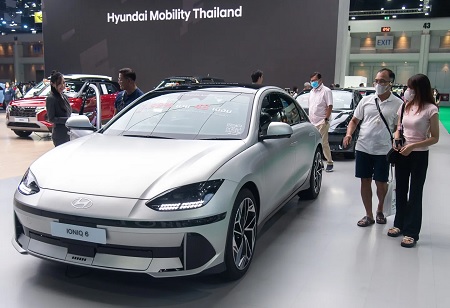
Hyundai Opens EV Plant in Thailand as 'Detroit of Asia' Shifts to Electric Cars

 Thailand, a key manufacturing center for Japanese, U.S., and increasingly Chinese automakers is now also drawing interest from Korean carmakers. According to Thailand's Board of Investment, Hyundai is investing 1 billion baht ($28.3 million) to establish a facility for assembling electric vehicles and batteries. This new plant will be situated southeast of Bangkok and is slated to begin production in 2026.
Thailand, a key manufacturing center for Japanese, U.S., and increasingly Chinese automakers is now also drawing interest from Korean carmakers. According to Thailand's Board of Investment, Hyundai is investing 1 billion baht ($28.3 million) to establish a facility for assembling electric vehicles and batteries. This new plant will be situated southeast of Bangkok and is slated to begin production in 2026.
The Thai government is working to shift its car industry towards electric vehicle production by offering tax incentives to attract EV manufacturers. Chinese EV companies such as BYD and Great Wall Motor have already established facilities in the Southeast Asian country. Hyundai’s project is part of the EV 3.5 package, a strategic plan designed to boost investments in the entire EV manufacturing ecosystem within Thailand, according to the Board of Investment.
Hyundai’s investment in Thailand marks another step in the Korean automaker’s expansion into Southeast Asia’s EV market. Last November, Hyundai opened an innovation center in Singapore, which also functions as an assembly facility for the Ioniq 5 and 6. Traditionally, Japanese brands have dominated Thailand’s consumer market, with carmakers like Toyota and Nissan operating assembly plants in the country since the 1960s. However, Chinese EV brands have gained traction in recent years, largely due to Thai government subsidies for consumers purchasing electric vehicles.
In the first quarter of the year, EV sales in Southeast Asia saw a significant increase, according to data from Counterpoint Research. Battery electric vehicle sales surged by 104% year-on-year, with Thailand representing 55% of all BEV sales. BYD was a major driver of this growth, capturing 47% of the regional market share. Thailand is BYD’s largest overseas market, and the Chinese EV leader recently inaugurated its first Southeast Asian factory in Thailand last month.

